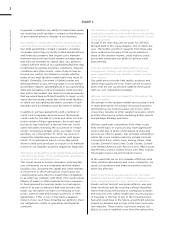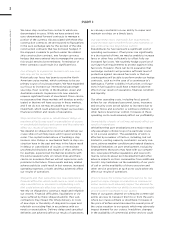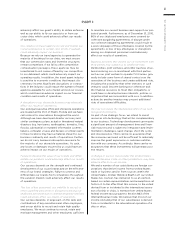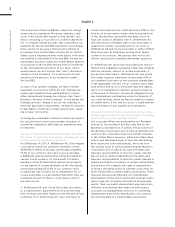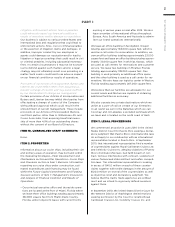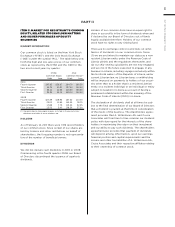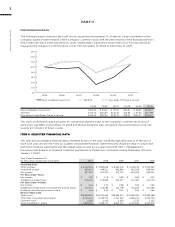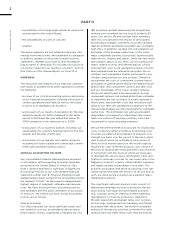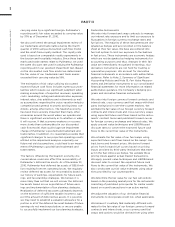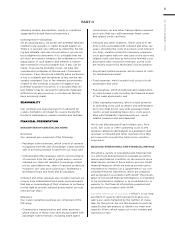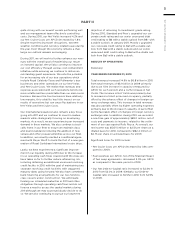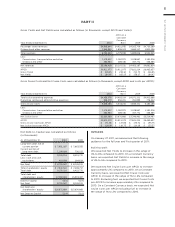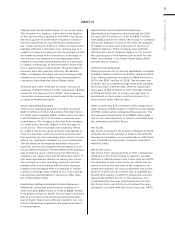Royal Caribbean Cruise Lines 2010 Annual Report Download - page 40
Download and view the complete annual report
Please find page 40 of the 2010 Royal Caribbean Cruise Lines annual report below. You can navigate through the pages in the report by either clicking on the pages listed below, or by using the keyword search tool below to find specific information within the annual report.
PART II
ROYAL CARIBBEAN CRUISES LTD. 37
ITEM 7. MANAGEMENT’S DISCUSSION AND
ANALYSIS OF FINANCIAL CONDITION AND
RESULTS OF OPERATIONS
CAUTIONARY NOTE CONCERNING FACTORS THAT
MAY AFFECT FUTURE RESULTS
The discussion under this caption “Management’s
Discussion and Analysis of Financial Condition and
Results of Operations” and elsewhere in this document,
including, for example, under the “Risk Factors” and
“Business” captions, includes forward-looking state-
ments under the Private Securities Litigation Reform
Act of 1995. All statements other than statements of
historical fact, including statements regarding guid-
ance, business and industry prospects and future
results of operations and financial position, made in
this Annual Report on Form 10-K are forward-looking.
Words such as “anticipate,” “believe,” “could,” “esti-
mate,” “expect,” “goal,” “intend,” “may,” “plan,” “proj-
ect,” “seek,” “should,” “will,” and similar expressions
are intended to identify these forward-looking state-
ments. Forward-looking statements reflect manage-
ment’s current expectations, are inherently uncertain
and are subject to risks, uncertainties and other factors,
which could cause our actual results, performance
or achievements to differ materially from the future
results, performance or achievements expressed or
implied in those forward-looking statements. Examples
of these risks, uncertainties and other factors include,
but are not limited to, the following:
• the impact of worldwide economic conditions on
the demand for cruises;
• the impact of the economic environment on our
ability to generate cash flows from operations, satisfy
the financial covenants required by our credit facili-
ties, or obtain new borrowings from the credit or
capital markets in amounts sufficient to satisfy our
capital expenditures, debt repayments and other
financing needs;
• the impact of disruptions in the global financial mar-
kets on the ability of our counterparties and others
to perform their obligations to us including those
associated with our loan agreements and derivative
contracts;
• if we are unable to appropriately balance our cost
management strategy with our goal of satisfying
guest expectations it may adversely impact our
business success;
• the uncertainties of conducting business internation-
ally and expanding into new markets;
• changes in operating and financing costs, including
changes in foreign exchange rates, interest rates,
fuel, food, payroll, airfare for our shipboard person-
nel, insurance and security costs;
• vacation industry competition and changes in indus-
try capacity and overcapacity;
• the cost of or changes in tax, environmental, labor,
health, safety, security and other laws and regulations
affecting our business;
• pending or threatened litigation, enforcement actions,
fines or penalties;
• emergency ship repairs, including the related
lost revenue;
• the impact of ship construction, repair or refurbish-
ment delays, ship cancellations or ship construction
price increases brought about by construction faults,
mechanical problems or financial difficulties encoun-
tered by shipyards or their subcontractors;
• negative incidents or adverse publicity concerning
the cruise vacation industry including those involv-
ing unusual weather conditions, natural disasters or
disruptions or the health, safety and security of
passengers;
• the international political climate, fears of terrorist
and pirate attacks, armed conflict, the unavailability
or cost of air service and the resulting concerns over
safety and security aspects of traveling;
• the spread of contagious diseases;
• a disruption to our shoreside business related to
actual or threatened natural disasters, information
systems failure or similar events;
• our ability to differentiate our products;
• our ability to manage our business activities that
involve our co-investment with third parties;
• our inability to adequately incentivize our travel
agents or changes and/or disruptions to the travel
agency industry;
• the loss of key personnel, strained employee rela-
tions and/or our inability to retain or recruit quali-
fied personnel;
• changes in our stock price or principal shareholders;



